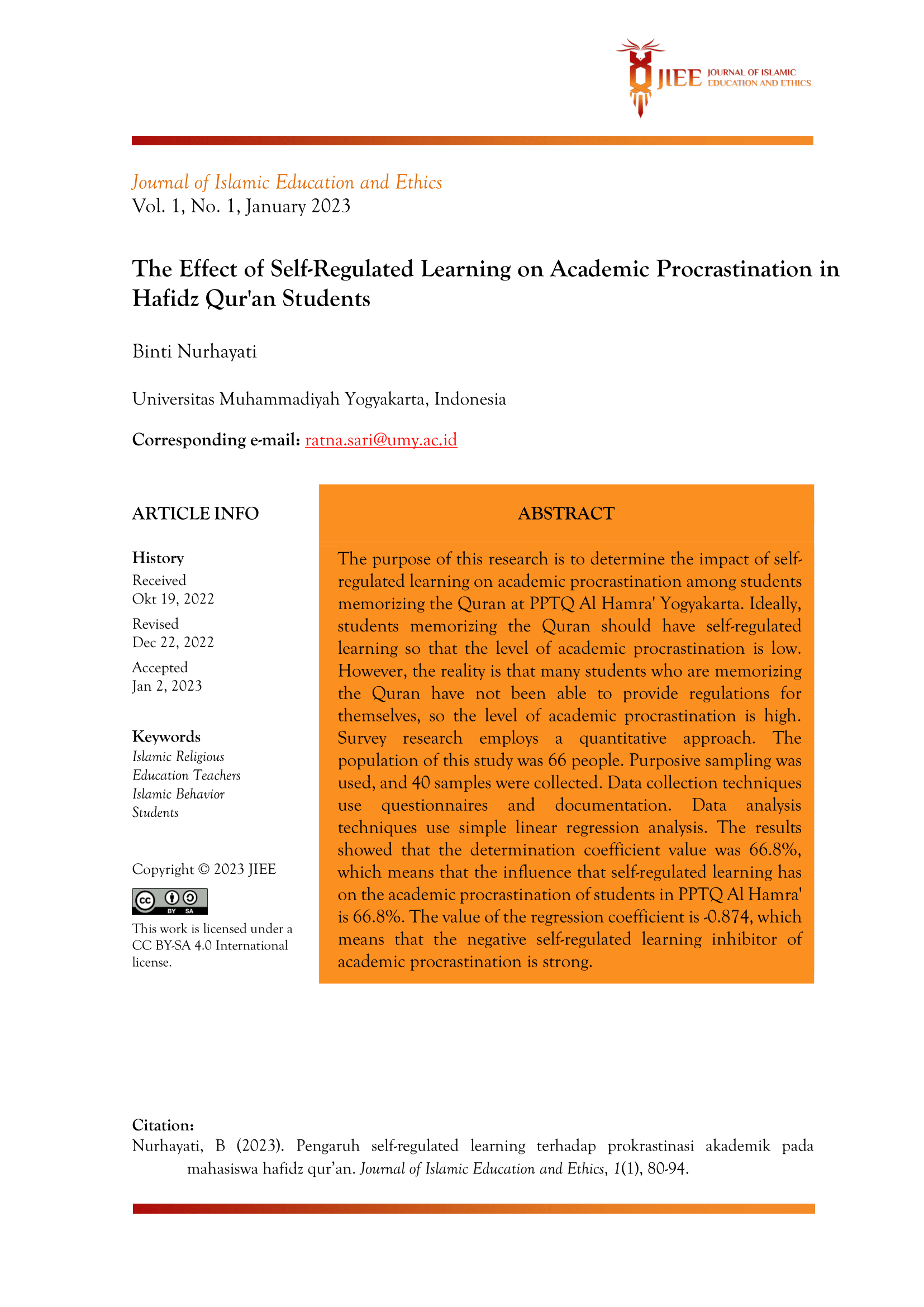The Effect of Self-Regulated Learning on Academic Procrastination in Hafidz Qur'an Students
DOI:
https://doi.org/10.18196/jiee.v1i1.8Keywords:
Islamic Religious, Education Teachers, Islamic Behavior, StudentsAbstract
The purpose of this research is to determine the impact of self- regulated learning on academic procrastination among students memorizing the Quran at PPTQ Al Hamra' Yogyakarta. Ideally, students memorizing the Quran should have self-regulated learning so that the level of academic procrastination is low. However, the reality is that many students who are memorizing the Quran have not been able to provide regulations for themselves, so the level of academic procrastination is high. Survey research employs a quantitative approach. The population of this study was 66 people. Purposive sampling was used, and 40 samples were collected. Data collection techniques use questionnaires and documentation. Data analysis techniques use simple linear regression analysis. The results showed that the determination coefficient value was 66.8%, which means that the influence that self-regulated learning has on the academic procrastination of students in PPTQ Al Hamra' is 66.8%. The value of the regression coefficient is -0.874, which means that the negative self-regulated learning inhibitor of academic procrastination is strong.
Downloads
References
Adiyanta, F. C. S. (2019). Hukum dan Studi Penelitian Empiris : Penggunaan Metode Survey sebagai Instrumen Penelitian Hukum Empiris. 2(4), 697–709. https://doi.org/10.14710/alj.v2i4.697-709
Alwan, Menza Hendri, dan D. (2017). Faktor-faktor yang mendorong siswa MIA SMAN mengikuti bimbingan belajar luar sekolah di Kecamatan Telanaipura Kota Jambi. Jurnal EduFisika, 02(01), 25–37. https://doi.org/10.22437/edufisika.v2i01.3945
Aziz, A., & Khaulah Aisyah Putri Siswanto. (2018). Hubungan antara Self Regulated Learning dengan kematangan karir pada siswa SMA. 10(1), 7–13. https://doi.org/10.31289/analitika.v10i1.1492
Eisenbeck, N., Carreno, D. F., & Uclés-juárez, R. (2019). From psychological distress to academic procrastination : Exploring the role of psychological inflexibility. Journal of Contextual Behavioral Science, 13(June), 103–108.https://doi.org/10.1016/j.jcbs.2019.07.007
Fitriani, U., & Mudjiran. (2019). Kontribusi Self Esteem terhadap prokrastinasi akademik dalam pengerjaan skripsi pada mahasiswa Psikologi. Jurnal Riset Psikologii, 0–12.http://dx.doi.org/10.24036/jrp.v2019i1.6342
Grund, A., & Fries, S. (2018). Understanding procrastination : A motivational approach. 121 (March 2017), 120–130. https://doi.org/10.1016/j.paid.2017.09.035
Hanifah, F., & Rusmawati, D. (2019). Pengaruh Pelatihan Self-Regulated Learning terhadap Prokrastinasi Akademik pada Siswa SMP Negeri 33 Semarang.8(2), 124–130. https://doi.org/10.14710/empati.2019.24411
Lubis, I. S. L. (2018). Hubungan regulasi diri dalam belajar dan efikasi diri dengan Prokrastinasi Akademik Mahasiswa. 4(2), 90–98. https://doi.org/10.31289/diversita.v4i2.1884
Mubarak, M. R. (2020). Pengaruh efikasi diri terhadap prokrastinasi akademik mahasiswa penghafal al Quran pondok pesantren bani yusuf Malang (Vol. 21, Issue 1). https://doi.org/10.1016/j.solener.2019.02.027
Permatasari, R., & Akip, M. (2019). Perangkat pembelajaran IPA berbasis Self-Regulated Learning untuk meningkatkan keterampilan metakognitif. Jurnal Pendidikan Informatika dan Sains, 8, 90–104. https://doi.org/10.31571/saintek.v8i1.1107
Putra, A. A. M. T. A. S., & Rustika, I. M. (2019). Peran kontrol diri dan pola asuh autoritatif terhadap prokrastinasi akademik mahasiswa Program Studi Pendidikan Dokter Fakultas Kedokteran Universitas Udayana. 6(2), 249–260.https://ojs.unud.ac.id/index.php/psikologi/article/download/54167/32110/
Rahmalia, P., Kardinah, N., Kurniadewi, E., Psikologi, F., Islam, U., Sunan, N., & Djati, G. (2019). Tipe kepribadian Conscientiousness dan Self-Regulated Learning mahasiswa dalam menghafal al Quran Juz 30. 6(2), 63–78. https://jpi.api-himpsi.org/index.php/jpi/article/view/85
Ruminta, Tiatri, S., & Mularsih, H. (2017). Perbedaan regulasi diri belajar pada siswa Sekolah Dasar Kelas VI ditinjau dari jenis kelamin. Jurnal Muara Ilmu Sosial, Humaniora, Dan Seni, 1, 286–294. https://journal.untar.ac.id/index.php/jmishumsen/article/view/1463
Santi, R., Tewal, B., & Untu, V. (2017). Analisis pengembangan karir dan kompensasi serta pengaruhnya terhadap kinerja karyawan PT. Bank BRI Unit Bahu Manado. Jurnal EMBA, 5(3), 3108–3117. https://doi.org/10.35794/emba.5.3.2017.17373
Saputra, W. N. E., Handaka, I. B., & Sari, D. K. (2019). Self-Regulated Learning Siswa SMK Muhammadiyah di Kota Yogyakarta : Kedua Orang Tua Berpengaruhkan? Jurnal Pendidikan, 04, 7–11. https://doi.org/10.26740/jp.v4n1.p7-11
Saraswati, P. (2017). Strategi Self Regulated Learning dan prokrastinasi akademik terhadap prestasi akademik. Intuisi : Jurnal Psikologi Ilmiah, 9(3), 210–223. https://doi.org/10.15294/intuisi.v9i3.14112
Sugiyanto, Syafrizal, & Rachmad kartolo. (2020). The effect of income persistency, capital structure and tax allocation between period of earning quality with company size as moderating variables. 461–482. http://openjournal.unpam.ac.id/index.php/Proceedings/article/view/6584
Ulum, M. I. (2016). Strategi Self-Regulated Learning untuk menurunkan tingkat prokrastinasi akademik siswa. Psympathic : Jurnal Ilmiah Psikologi, 3(2), 153–170. https://doi.org/10.15575/psy.v3i2.1107
Umaroh, S. K., Mariskha, S. E., Control, S., & Akademik, P. (2020). Pengaruh efikasi diri dan kontrol diri terhadap prokrastinasi akademik pada mahasiswa Universitas 17 Agustus 1945 Samarinda. 3(1), 35–43. https://doi.org/10.31293/mv.v3i1.4808
Wahidmurni. (2017). Pemaparan metode penelitian kuantitatif. UIN Maulana Malik Ibrahim Malang, 1–16. http://repository.uin-malang.ac.id/1985/

Downloads
Published
How to Cite
Issue
Section
License
Copyright (c) 2023 Journal of Islamic Education and Ethics

This work is licensed under a Creative Commons Attribution-ShareAlike 4.0 International License.




